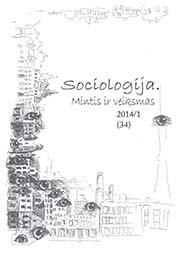Galios samprata elito ir pliuralizmo teorijose
The Concept of Power in Elite and Pluralist Theories
Author(s): Rūta MazgelytėSubject(s): Social Sciences
Published by: Vilniaus Universiteto Leidykla
Keywords: power; elite theories; pluralist theories.
Summary/Abstract: This article analyses and compares the concept of power in elite and pluralist theories, particularly the work of Michels and that of the pluralists Lindblom and Woodhouse, with the aim of considering how power is interpreted within these theories. While elite theories emphasise the central role of the elite in shaping political change, pluralist theories oppose elite theories and do not attribute such a significant role to the elite. A comparison of elite and pluralist views on the issue of power consolidation, however, shows a basic assumption underlying the two bodies of work: for both, power is concentrated in the hands of the ruling elite, which is stable and which is slowly renewed with new members. Via direct or indirect assimilation, the ruling elite absorbs those connected with strategic state resources (military, economic, and so forth), and maintains its integrity and unity by, for instance, integrating opponents into state bureaucracy structures, or through the use of force, or assimilation or the creation of internal closure via internal rotation. Those not belonging to the elite – poor, marginal actors – are disconnected from the realisation of their interests.
Journal: Sociologija. Mintis ir Veiksmas
- Issue Year: 2014
- Issue No: 01
- Page Range: 168-185
- Page Count: 18
- Language: Lithuanian

